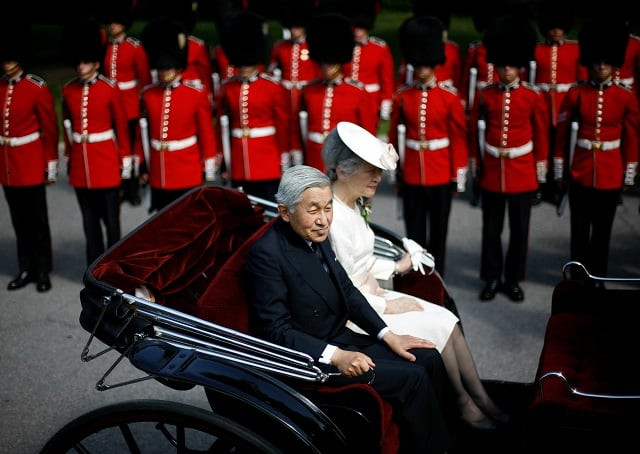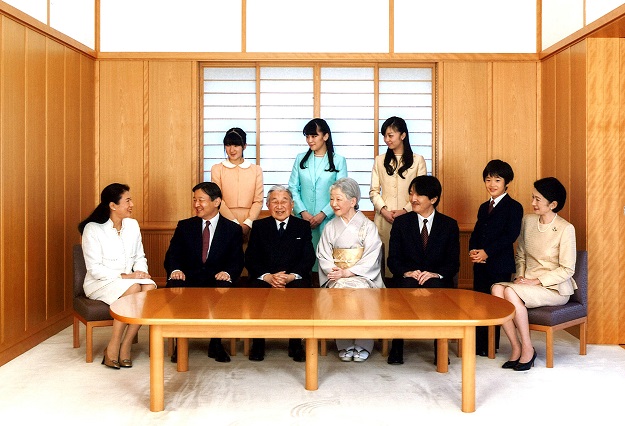Japan cabinet approves bill allowing emperor's abdication
Reports suggested that 83-year-old Akihito could step down at the end of December 2018

Japan's Emperor Akihito and Empress Michiko arrive by a Royal Canadian Mounted Police escorted landau at Rideau Hall in Ottawa PHOTO: REUTERS
The bill will now be sent to parliament for debate and likely receive swift final approval, Chief Cabinet Secretary Yoshihide Suga said after Prime Minister Shinzo Abe's cabinet signed off on the legislation.
Abdication must take place within three years of the bill becoming law. Earlier this year reports suggested that 83-year-old Akihito could step down at the end of December 2018 and be replaced by Crown Prince Naruhito on January 1, 2019.
Reports of his desire to retire surprised Japan when they emerged last July. In August he publicly cited age and declining health, which was interpreted as his wish to hand the crown to his eldest son.
But current Japanese law has no provision for abdication, thus requiring politicians to craft legislation to make it possible. The status of the emperor is highly sensitive in Japan given its 20th century history of war waged in the name of Akihito's father Hirohito, who died in 1989.
Japan princess to wed, sparking debate on shrinking royal family
Revered as a demigod before and during the conflict, Hirohito was reduced to a mere figurehead as part of postwar reforms. Akihito has won plaudits for seizing upon the constitutionally-prescribed role of national symbol and there is wide sympathy for his wish to retire.
While a majority of the Japanese public supports a permanent law on abdication, they have also expressed support for the current bill for the sake of realising Akihito's smooth transition from the throne.
While abdications are far from unknown in Japanese history, the last one was in 1817.
 Japanese Emperor Akihito (front, 3rd L) and Empress Michiko (front, 4th L) smile with their family members (front L-R) Crown Princess Masako, Crown Prince Naruhito, Prince Akishino, Prince Hisahito and Princess Kiko, (back L-R) Princess Aiko, Princess Mako and Princess Kako during a family photo session for the New Year at the Imperial Palace in Tokyo, in this handout picture taken November 15, 2015 and released on January 1, 2016 by the Imperial Household Agency of Japan. PHOTO: REUTERS
Japanese Emperor Akihito (front, 3rd L) and Empress Michiko (front, 4th L) smile with their family members (front L-R) Crown Princess Masako, Crown Prince Naruhito, Prince Akishino, Prince Hisahito and Princess Kiko, (back L-R) Princess Aiko, Princess Mako and Princess Kako during a family photo session for the New Year at the Imperial Palace in Tokyo, in this handout picture taken November 15, 2015 and released on January 1, 2016 by the Imperial Household Agency of Japan. PHOTO: REUTERSThe leading opposition Democratic Party has argued the law should be permanently changed to ensure stable future successions, but is reportedly on side with the current one-off bill after talks with the ruling bloc. Some scholars and politicians have argued that changing the law to allow any emperor to abdicate would risk Japan's monarchs becoming subject to political manipulation.
The issue has also highlighted concerns over a potential succession crisis in one of the world's oldest monarchies. A government panel in April issued a warning over the dwindling number of male heirs.
Only men are allowed to become emperor under current law, though Japan has had empresses in past centuries.
60 years after Japan army husband fled, Vietnam war bride clings to love
Female members of the imperial family must give up their royal status when marrying a commoner, underscored by news this week that one of Akihito's granddaughters plans to marry her college sweetheart.
When Naruhito, who has a daughter but no sons, ascends the throne, his younger brother Akishino will be next in line, followed by Hisahito, Akishino's 10-year-old son.
But after that there are no more eligible males, meaning the centuries-old succession would be broken if Hisahito fails to have a son in the future. Many Japanese believe the sustainability of the throne can be solved by allowing for female succession, but traditionalists vehemently oppose the idea.
Underscoring the urgency of the situation, a government panel tasked with making recommendations on the abdication issue said late last month in its final report that addressing the succession crisis cannot wait. "The sustainability of the imperial system is in real danger," Takashi Mikuriya, head of the panel, told the Mainichi Shimbun daily in an interview.



















COMMENTS
Comments are moderated and generally will be posted if they are on-topic and not abusive.
For more information, please see our Comments FAQ